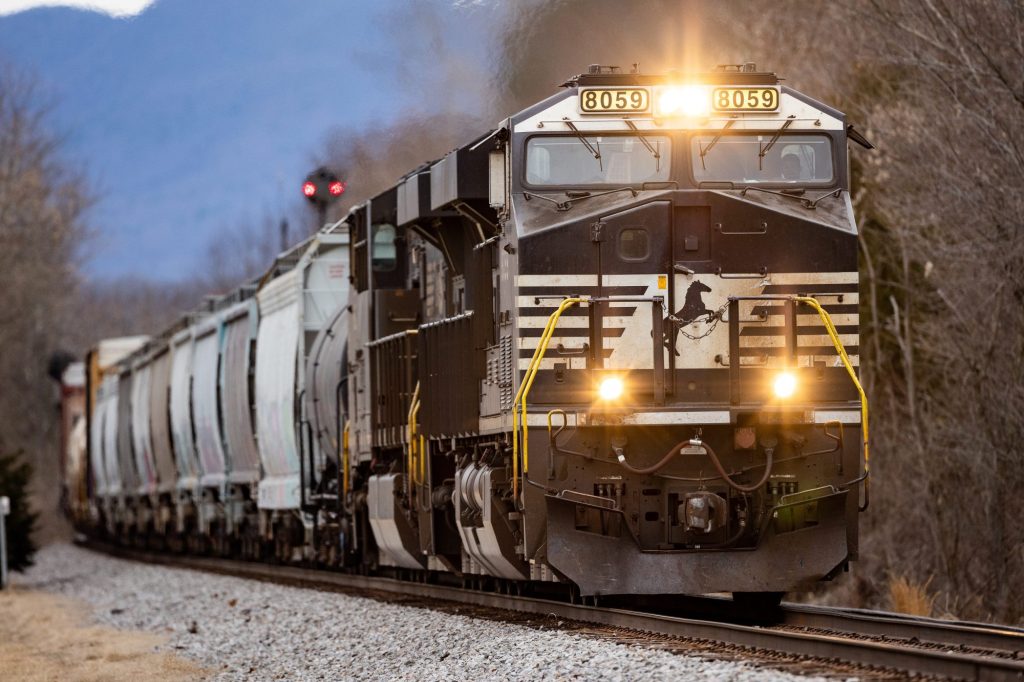U.S. railroad launches book-and-claim scheme to reduce Scope 3 emissions
Norfolk Southern pioneered better emissions tracking in rail freight. Now it’s partnering with customers to accelerate the use of biofuels in its locomotives. Read More

Key takeaways:
- Norfolk Southern is allowing freight customers to buy Environmental Attribute Certificates, which they can use to reduce Scope 3 emissions.
- Similar schemes already exist in aviation and maritime shipping.
- The company has a goal of having lower-carbon fuels account for 7 percent of its fuel mix by 2027 and 20 percent by 2034.
A major U.S. railroad is joining the aviation and maritime shipping industries in launching a book-and-claim scheme to help customers reduce freight emissions.
Norfolk Southern, which operates more than 3,000 locomotives and moves around 7 million shipments annually, unveiled its RailGreen system last week.
Like other book-and-claims schemes, RailGreen is designed to allow any customer to pay for and claim Scope 3 benefits. When biodiesel is used in a Norfolk Southern locomotive, the company generates an Environmental Attribute Certificate (EAC) for every ton of emissions avoided. Customers then purchase EACs and count them against Scope 3 emissions. The certificates cannot be used twice or passed to another company.
The scheme was inspired in part by an equivalent maritime project known as Ship Green developed by maritime shipper Hapag-Lloyd, said Josh Raglin, Norfolk Southern’s chief sustainability officer. The Sustainable Aviation Buyers Alliance operates a similar scheme for air travel.
Displacing diesel
Norfolk Southern’s biodiesel will be produced from vegetable oils, animal fats and used cooking oil, said Raglin. The company’s locomotives do not have to be modified to work with the fuel — provided that the lower-carbon alternative does not make up more than 20 percent of the mix. Norfolk Southern is working on introducing another alternative fuel, known as renewable diesel, that can completely replace fossil diesel. Raglin said the company has a goal of having these lower-carbon fuels account for 7 percent of its fuel mix by 2027 and 20 percent by 2034.
Norfolk Southern is aiming to use 9 million gallons of biodiesel this year, which, if certified through the RailGreen system, would generate EACs corresponding to 70,000 tons of CO2. Raglin declined to disclose the exact cost of an EAC, but said that it would be less than $100.
The scheme builds upon Norfolk Southern’s emissions tracking technology, which checks fuel burn in locomotives every 15 minutes. The data is used to report emission shares to individual customers, adjusted for the weight of freight they are moving, distance travelled and other factors.
Intermodal impacts
Fuel switching initiatives are worth pursuing because no new technology is required to implement the schemes, noted Scott Bernstein, founder of the Center for Neighborhood Technology and an expert on railroads and other aspects of regional and urban planning. The downside, he added, is that they can distract from investing in more consequential changes: “Sometimes fuel switching ends up being an excuse for not making capital investments in a more efficient sort of system overall.”
One example that Bernstein advocates for is intermodal freight, in which transport networks are redesigned to shift the burden from road to rail. The idea was the subject of a 2023 report by the Environmental Defense Fund, to which Bernstein contributed. Because emissions from rail are around 75 percent lower than the equivalent from trucking, shifting freight from one modality to another can produce big benefits, regardless of the fuel used.
“Going from truck to train is probably a much greater impact on decarbonization than staying with train and just changing the fuel ingredient,” said Bill Loftis, a supply chain expert, author of the EDF report and owner of Supply Chain Ecology, a consultancy. “It’s bound to be because rail is tremendously more efficient than truck.”
[Connect with more than 3,500 professionals decarbonizing and future-proofing their organizations and supply chains through climate technologies at VERGE, Oct. 28-30, San Jose.]

Subscribe to Trellis Briefing
Featured Reports

The Premier Event for Sustainable Business Leaders
















